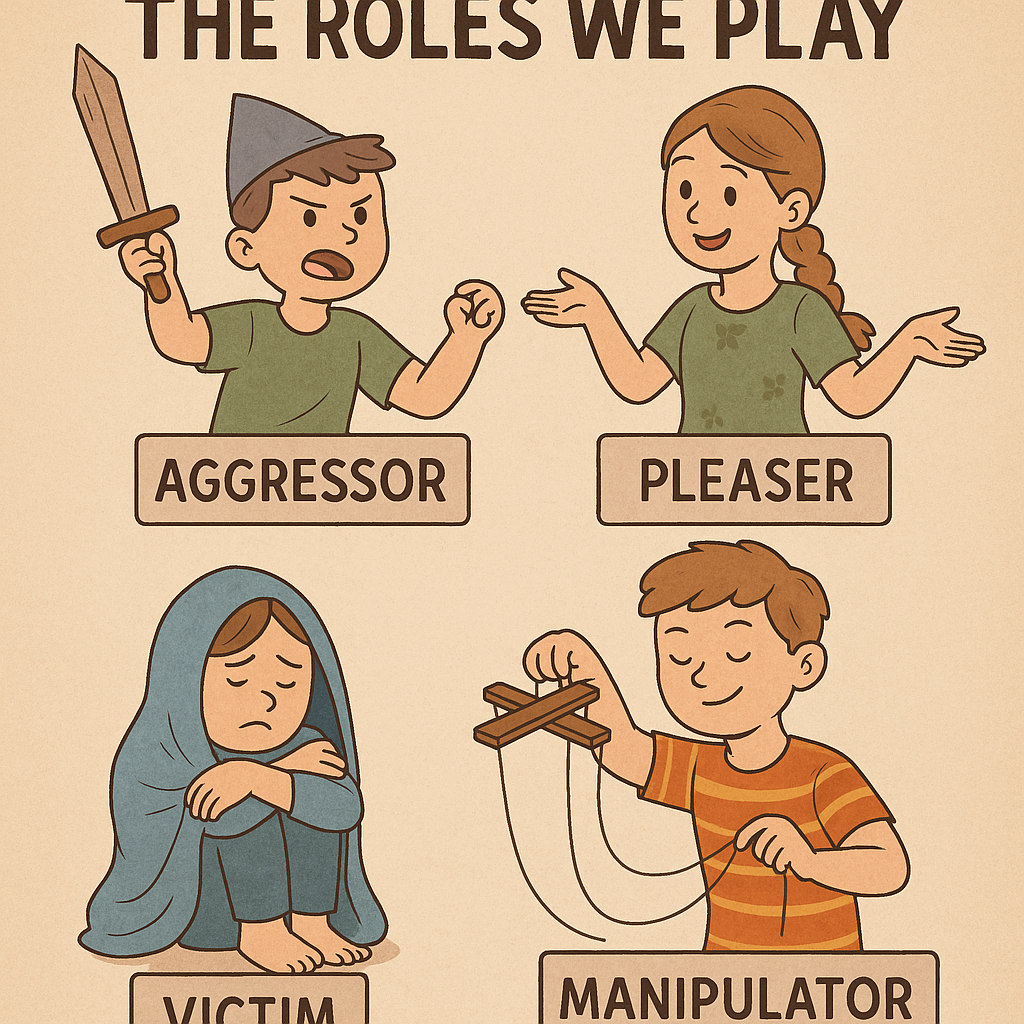The Roles We Play – Emotional Survival and Patterned Behaviour
From the moment we are born, we begin to learn how to get our emotional needs met. As children, we instinctively observe and remember: What behaviour brings comfort? What expression gets us picked up? What words make someone listen? Whether it’s a cry, a tantrum, a silent withdrawal, or a charming smile—these responses begin to shape the strategies we carry into adulthood.
A child who throws a tantrum and gets the toy learns that heightened emotion brings reward. A child who stays quiet and good to avoid parental rage learns that silence brings safety. A child who overachieves to gain love equates value with performance. These behaviours aren't just childish whims—they’re early emotional negotiations, trial-and-error attempts to influence the world and secure connection, love, safety, and attention.
As adults, the patterns don’t vanish. They evolve. We still negotiate for our needs, only now it’s with partners, friends, colleagues, or courts.
We still want to be seen, to be heard, to be understood, to be soothed.
And often, we still use the strategies that once worked.
Some of us become the victim—drawing sympathy, avoiding accountability, hoping someone will rescue us.
Some of us become the aggressor—demanding, controlling, using fear or dominance to stay in power.
Some become the pleaser—over-giving, over-functioning, hoping to be loved for how much we sacrifice.
Some manipulate subtly, shaping stories, withholding affection, or selectively showing emotion to get what we want.
And often—we succeed.
For a moment, for a day, for a season—we get the need met.
But at what cost?
Control is Not Connection
Through my observations of couples, families, and my own self-reflection, I’ve seen a pattern:
When our behaviours are driven by a need to control, rather than to connect or be vulnerable, we rarely get what we truly desire.
We might win a moment of power.
But we lose respect.
We might get obedience.
But we lose emotional safety.
We might gain temporary reassurance.
But we lose long-term connection.
When one partner submits out of fear or fatigue, and the other remains dependent on control to feel stable, true unity becomes impossible. What emerges instead is co-dependency—a tangled bond where both people rely on each other not for love, but for emotional survival.
In these dynamics, each person unconsciously believes the other is responsible for their emotional state.
“If you don’t reassure me, I’ll panic.”
“If you don’t obey me, I’ll rage.”
“If you don’t notice me, I’ll withdraw.”
It’s a transactional loop—full of frustration, resentment, and repeated disappointment.
The truth is painful but freeing:
No one is here to solve our needs.
A partner can support, soothe, and walk beside us—but they cannot fix our wounds.
And if our needs are always tied to someone else’s actions, then we are never free.
The Repetition of What "Works"
So why do people keep repeating these unhealthy patterns?
Because they often work.
And because we’re not taught to measure the collateral damage—only the immediate result.
The woman who plays the victim may find temporary comfort, but loses self-respect.
The man who uses aggression may get his way, but loses intimacy.
The person who manipulates with silence or seduction may win attention, but never true connection.
These patterns create cycles—familiar, addictive, and usually inherited. We rarely pause to ask:
What is this costing the people I love? What is this costing me?
Children see these patterns. They absorb them.
But even knowing it’s damaging isn’t always enough to make someone stop.
Even therapy or well-written books can’t undo what real life contradicts.
If someone’s pattern still gets results—still brings love, sex, compliance, reassurance—then why change?
Change Comes From Within
Real change, in my experience, comes from either loss or true self reflection and a desire to become something more.—
Loss of a relationship, a child pulling away, an emotional breakdown, or a moment so confronting it breaks the illusion.
Sometimes, that change comes from deep self-reflection—a courageous look in the mirror that says:
“I don’t want to be like this anymore. I don’t like who I’m becoming. I choose something different.”
It’s rare. But it’s real.
And those who choose that path are the ones I admire the most.
Not because they are perfect—but because they are brave enough to break their own pattern, to go against everything they were taught, everything they once used to survive.
They choose growth.
They choose accountability.
They choose connection over control.
That choice is not easy. It’s painful. It’s slow. It takes time.
But it’s the only way we build real relationships—not based on need, but on mutual respect, autonomy, and love.
Ready to calm your mind and take control of your emotions after separation? Grab our 4-Week Coaching Program: Grounding Yourself After High-Conflict Separation for $35 - practical, compassionate, and made for this exact moment.
